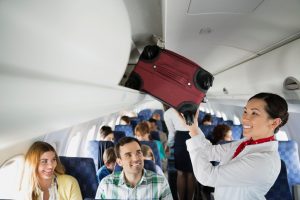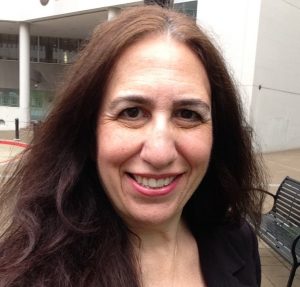Travel Tips From A Solo/Small Firm Road Warrior
How to get around the country.
 If you’re a lawyer employed by a large firm or working in-house, travel is never a problem. Airline tickets and hotel reservations magically materialize — frequently along with a company-issued laptop — and you can set up your email to forward questions to a partner or colleague in your absence. But how does a solo do travel? I’ve asked Michael D.J. Eisenberg, of The Law Office of Michael D.J. Eisenberg in Washington D.C., a veterans benefits and federal employment attorney with a national practice who I interviewed here about his practice at MyShingle.com and who’s frequently on the road.
If you’re a lawyer employed by a large firm or working in-house, travel is never a problem. Airline tickets and hotel reservations magically materialize — frequently along with a company-issued laptop — and you can set up your email to forward questions to a partner or colleague in your absence. But how does a solo do travel? I’ve asked Michael D.J. Eisenberg, of The Law Office of Michael D.J. Eisenberg in Washington D.C., a veterans benefits and federal employment attorney with a national practice who I interviewed here about his practice at MyShingle.com and who’s frequently on the road.
Q. Thanks for agreeing to offer advice to readers on travel. For those who haven’t read the earlier part of this interview, why do you travel so much for your practice?
A. I have a national practice focusing on veterans benefits and federal employment law, and 95 percent of my clients are located forty miles or more outside of the Washington D.C. metropolitan area where my firm is headquartered. The amount of travel and location depends upon the type and status of the proceeding.

Legal AI: 3 Steps Law Firms Should Take Now
In VA cases where I represent veterans, the amount of travel depends upon the path that my client selects: either a Decision Review Officer (DRO) hearing or a traveling Board for Veterans Appeal (BVA) hearing at their local Veterans’ Affairs Regional Office (VARO), a BVA videoconference or an in-person hearing in Washington, DC. Typically, the client will choose to appear in Washington, DC which means that I won’t need to leave Town. However, I still fly out to different locations several times a year for DRO hearings which are typically done in 36 to 48 hours in order to keep costs down.
In Federal Employee employment cases, my time on the road may range from a quick 36-hour trip to over a week depending upon the procedural posture of the case. Recently, I conducted a “Notice of Proposed Removal” oral presentation in Michigan; I flew to Detroit, drove less than two hours to the area, conducted the hearing and flew out that night — all less than 30 hours. On the other hand, I have flown to California from three to nine days to conduct depositions and hearings. During one particularly active month, I flew from San Antonio, Texas to conduct a Physical Examination Board hearing to San Diego, California, for a week’s worth of depositions, to Seattle, Washington, to conduct another Physical Examination Board.
Q. How frequently do you travel each month — and do your trips involve air or ground transportation?
A. I’d guess that I travel at least once a month. As I just described, my travel ebbs and flows. I use all means of transportation: planes, trains and automobiles depending upon my destination.
Sponsored

The Business Case For AI At Your Law Firm


Navigating Financial Success by Avoiding Common Pitfalls and Maximizing Firm Performance

Early Adopters Of Legal AI Gaining Competitive Edge In Marketplace

The Business Case For AI At Your Law Firm

Q. How do you recover the cost of travel from your clients? Do you have a provision in your engagement agreement describing your practices for billing for travel?
A. Costs are clearly delineated in the engagement letter. My engagement agreement provides that travel costs are separate from fees and must be paid for within thirty (30) days regardless of the case’s outcome. On cases with greater potential costs, I ask for a retainer (with an evergreen clause) in the beginning.
Q. How do you schedule your trips — and do you or your schedulers use any special tools or services to book your trips?
A. I use a hybrid approach. I’ll consult Travelocity to help me figure out the best times and prices. But then, I go directly to the airline to reserve my tickets. If I have to change a flight, it can be a pain to do so through Travelocity and if you book your flight through Travelocity, the airlines tend not to work with you.
Q. Once your travel is set, how do you keep track of reservations, tickets, boarding passes, etc.? Do you use any special apps?
Sponsored

Legal AI: 3 Steps Law Firms Should Take Now

Is The Future Of Law Distributed? Lessons From The Tech Adoption Curve
A. Apple Wallet (for boarding passes and credit cards), FlightTrack (for keeping track of my flights), and TripIt (for keeping track of my trips (flight, hotel, car, etc.).
Q. Do you take advantage of frequent flyer miles and other customer loyalty programs for travel? Any that you would recommend?
A. I am a member of many frequent flyer programs. Because of the tight schedule I like to keep and also the fact that I want to keep costs down for my clients (veterans typically don’t have a lot of money), I fly on most of the airlines. I think for loyalty programs as a whole, American Express, and the respective type of card you want, is generally the smarter way to go. This way it does not matter which airline you are on, you’re going to get a collective bonus from AMEX.
Likewise, I am a member of several hotel chains. But, I typically try to use a Choice Hotel. Typically, the hotels are nice and not over-the-top in price.
Out of all of the car rental places, I typically use Enterprise. Their service is great!
Q. Do you find customer rating services like Yelp or Trip Advisor useful and/or accurate for finding restaurants or hotels while you’re away?
A. Rarely. I try to triangulate my stay among a hotel, a Starbucks and the site I’ll be working — Google Maps. If I am staying for a particular length of time, I may venture out and try something different for dinner.
Q. What are some of your technology essentials for the road that enable you to handle hearings, depositions and other matters on the road?
A. I think what some people forget is that you are not guaranteed Wi-Fi at every place you go. For that reason, I have a generous data plan on my iPhone and iPad should I ever need access where there is no Wi-Fi. Further, since public Wi-Fi is not always safe, I use a Virtual Private Network (VPN) like Cloak to keep prying eyes out of my business on the Internet.
A good pair of either over- or on-the-ear headphones are essential. There is always going to be some kind of noise that is going to disturb you on a plane, an airport, a train — nice to be able to drown them out. (I have Bose Bluetooth on my ear headphones — love them. You can use Bluetooth devices on a plane in air and that lack of a wire is very pleasant!
If you are going to fly a lot, look into TSA PreCheck. It makes getting through the lines a lot smoother for travel within our borders. It’s only a little more to get Clear for international travel. I’ll probably upgrade to Clear soon.
Lastly, a good tech travel bag is essential! I use a Samsonite four-wheel bag with a telescoping handle. It’s FAA-compliant, plenty of storage room for your laptop, charger, iPad, iPhone, headphones, power strip (important) and other computer accessories.
Q. What kind of technology do you use to stay in touch with your team back at the office?
A. My iPhone (for e-mail, Slack, Dropbox and phone), my iPad (for e-mail, Slack and Dropbox), MacBook Pro (for e-mail, Slack and Dropbox). I also use several types of Bose Bluetooth headphones (both single- and two-ear) with the phone for talking. The lack of a wire makes things more comfortable and freeing while on the go.
Q. What about relaxation or recreation on the road — any time for that, and if so, what do you like to do?
A. I’ve been to some great places with great places to sightsee. But, I am typically there for work and since I try to keep the schedule tight (so as to economize the client’s money) I don’t have much time for sightseeing. I try to exercise. If I am somewhere that I can jog around, e.g., downtown San Francisco, I’ll try to take the opportunity. Also, if there is family in town, I will almost always make an effort to have a meal with them.
Q. Do you like traveling as much as you do for your practice — and do you have any tips for other solos and smalls who are trying to find the right balance between too little or too much travel?
A. Yes, and no: I miss my wife of course; but it’s nice to break the routine up a bit. A new location to do work. It’s like going to a coffee shop in order to get out of the office for a little while. With technology, your office can be at your fingertips anywhere you go! Which of course, can be a blessing and a curse at the same time. Some programs that help me get the job done: Dropbox, Daylite (a client management portal for the Mac made for the Mac), Slack, Word.
Q. Final thoughts?
When it comes to technology and traveling, security is a must. Password protect your computer and devices. Encrypt your hard drive to keep prying eyes away from the privileged material. Utilize several backup systems — include one online system. It’s unlikely that you’ll be able to get back to the office while actually on the road. This will allow you to get up and running while on the go. Use a password manger to store and sync your passwords across your devices. This way you can utilize other machines if yours goes down or is stolen. Use a VPN when you are using public Wi-Fi so others can’t see what you are doing. But lastly, the best defense is you — be aware of your surroundings and keep an eye on your stuff.
Safe travels!
 Carolyn Elefant has been blogging about solo and small firm practice at MyShingle.comsince 2002 and operated her firm, the Law Offices of Carolyn Elefant PLLC, even longer than that. She’s also authored a bunch of books on topics like starting a law practice, social media, and 21st century lawyer representation agreements (affiliate links). If you’re really that interested in learning more about Carolyn, just Google her. The Internet never lies, right? You can contact Carolyn by email at elefant@myshingle.comor follow her on Twitter at @carolynelefant.
Carolyn Elefant has been blogging about solo and small firm practice at MyShingle.comsince 2002 and operated her firm, the Law Offices of Carolyn Elefant PLLC, even longer than that. She’s also authored a bunch of books on topics like starting a law practice, social media, and 21st century lawyer representation agreements (affiliate links). If you’re really that interested in learning more about Carolyn, just Google her. The Internet never lies, right? You can contact Carolyn by email at elefant@myshingle.comor follow her on Twitter at @carolynelefant.







